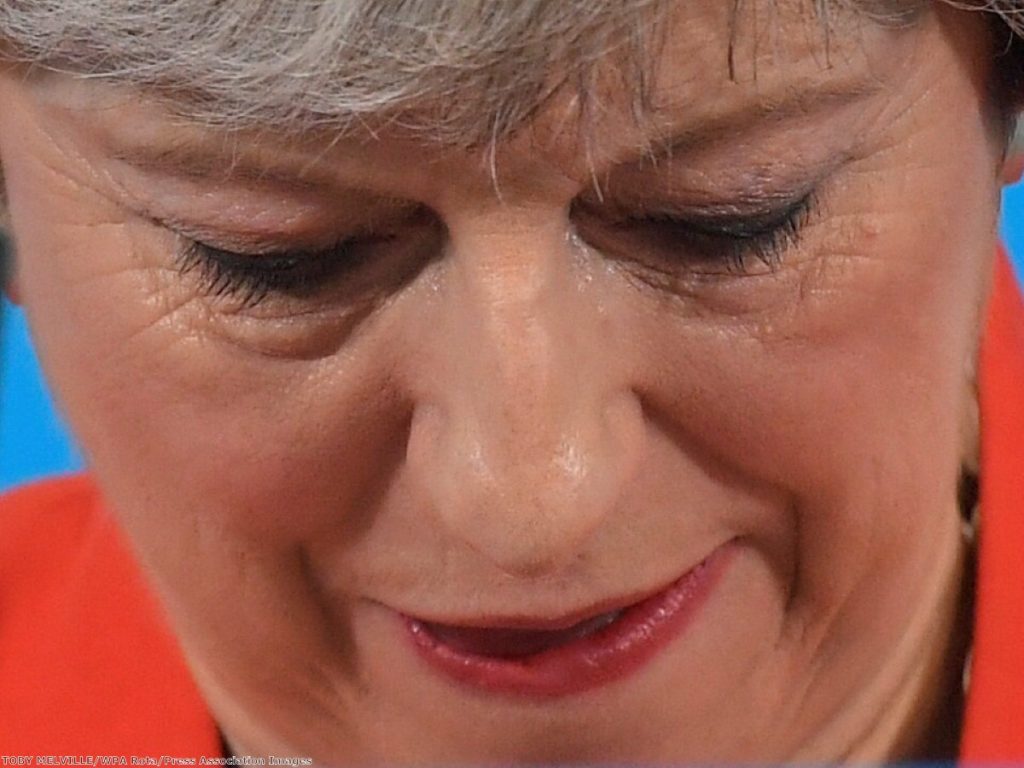By Chaminda Jayanetti
One detail of the 'dementia tax' fiasco stands out from all the others. This morning's Financial Times reported that the policy was added to the manifesto at the last moment without consulting the Cabinet:
"The plan, dubbed the 'dementia tax', was added at the last minute by Nick Timothy, the prime minister's co-head of staff, party figures have admitted."
As a revelation of how policy is made, it's astonishing. Timothy, May's policy 'guru', simply scribbled it down at the last moment like a slacker teenager doing their coursework the night before the deadline.


It is hard to conceive of a more irresponsible and lackadaisical approach to what is a significant change to one of the country's key frontline services, potentially affecting hundreds of thousands of people. There was no pledge to review or consult, no building on a carefully formulated policy proposal such as Andrew Dilnot's care costs cap (which the manifesto ditched).
This is playing with people's livelihoods and treating them as an afterthought. No party with any pretension to governing the country should be able to get away with this.
The Tories feared they weren't getting away with it – or at least, that they weren't going to escape with a three-figure landslide majority – and so today they dramatically U-turned, unprecedented for a flagship manifesto pledge during an election campaign.
Having insisted that anyone with assets worth more than £100,000 would have to pay for care in their own home – a change to the current threshold of non-housing assets above £23,500 – Theresa May announced that a Tory government would consult on a cap on how much anyone would have to pay towards their care costs.
Just four days after ditching the Dilnot cap, they're bringing a version of it back. A complacent Tory campaign has skidded off the road and crashed into a lamppost.
May is trying to claim that there's been no change to the policy. We cannot say she's lying, but there's no way of reading the policy that leads to the conclusion she's telling the truth. An intelligent and honest politician would have said they were responding to public concerns, "because good government is about being responsive". That way she could have turned this into a positive. But May has shown little evidence of good judgement in her tenure as prime minister.
With Labour closing in the polls, this issue could now go one of two ways.
It could remain an argument about social care – about how much people could stand to lose from their assets. This is very risky ground for the Conservatives – it is bad for elderly homeowners, but also for middle aged children expecting to inherit. Notably the recent poll swings against the Tories have been heaviest among the middle aged.
If the Conservatives stick to their guns and don't name a preferred figure for their cap, it's likely the issue will continue along these lines – a row about people's homes and care that won't go away. That's not good news for the Tories – they won't lose this election, but it will bring back memories of the 'nasty party' just as the original policy did, and scare off lifelong Labour voters whose support May is seeking. A Tory majority of under 60 will be seen as a major missed opportunity by Conservatives and May will get the blame.
The alternative is that this becomes a question of 'leadership' – is May really strong and stable? Can she really show backbone in Brexit talks? Can you trust her? Is she honest?
The answer to all of these is no, and the opportunity to cast the Conservative leader in a bad light would be irresistible to Labour. But if the focus of this story, and of the remainder of this campaign, becomes about leadership and not the policy itself, then the dynamic changes. May's leadership qualities will not be judged in a vacuum. They will be judged against Jeremy Corbyn's.
If Leave-voting and Conservative-leaning 50+ voters are unimpressed by May's flailing on this issue, they're certainly not about to be won around to a leader they dismissed as a viable prime minister shortly after he became Labour leader. It's worth noting that the Tories' travails over social care have largely hidden from view Corbyn's multiple conflicting statements on the benefit freeze since Labour decided, apparently by accident, not to axe it in their manifesto.
The Conservatives' cynicism on adult care has been outrageous. George Osborne – now glorying in May's struggles – deliberately crashed the cross-party consensus on taxing estates to fund care before the 2010 election. He then slashed funding for councils, knowing that care services would be worst hit, knowing that middle class journalists wouldn't care, and knowing that those councils would get much of the blame. The 2015 Tory manifesto pledged to introduce the Dilnot cap in 2016 – but literally weeks after winning an unexpected majority, this was kicked back to 2020. Then last week it was unceremoniously dumped in the Tory manifesto. Today it was brought back. Perhaps. Sort of. Maybe.
No party that governs like this should be allowed to continue doing so. But just like two years ago, the alternative prime minister remains wholly unpalatable to most voters. Labourites blowing raspberries over the "weak and wobbly" prime minister should be careful of turning this into a personality contest. It's the surest way of letting the Tories get away with it.
Chaminda Jayanetti is covering the general election for Politics.co.uk. He tweets here.
The opinions in politics.co.uk's Comment and Analysis section are those of the author and are no reflection of the views of the website or its owners.









